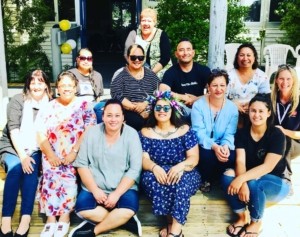
Diploma in Health & Wellbeing Applied Practice students who travelled to Rarotonga: Bonnie Parata, Christine Collins, Haley Hollis, Dan Croskery, Marina Dewes Programme Coordinator- Lesley Blair( did not travel) , Liz Cairns, Allison Chambers, tutor Claudia Maaka, June Hare, Steevie Hunia, Niiki Keepa
The exchange of practices and a look into how another relatable indigenous culture deals with mental health was behind a trip to Rarotonga by EIT Tairāwhiti mental health and addiction students.
It was an end-of-course climax for the 14 students and their tutor Claudia Maaka.
In their first year students travelled to Rotorua to see rehabilitation facilities and people detoxing.
“Going to Rarotonga at the end of year two was about exchanging practices and having a good look at mental health and addiction in another indigenous culture that was not too far away and relatable to Maori.”
Another big help was that EIT has a relationship with the polytechnic on Rarotonga, says Claudia.
Work for the trip began at the start of the year with students broken into three groups to look after fundraising, research and itinerary.
A major part of the fundraising was selling food like sausages, burgers, fry bread and chop suey outside Gisborne’s nightclub.
“This was successful and two pronged in that the students were interacting with the young ones about mental health at the same time.”
The class topped up their food money with a thistle-cutting job on Marotiri Farm and EIT funded a van for transportation.
After arriving to hot wet weather, the class spent the first couple of days of the eight-day trip getting used to the 38-40 degree heat and humidity and getting their bearings.
“Our biggest focus was to get into the mental health system and see how it functioned and find out what were the struggles.”
Two days were spent on the mental health ward at the hospital.
“The biggest issue there is depression and the biggest problem drug – alcohol. Suicide numbers had decreased in the past year.
“There have been no suicides at all in the past year and we asked why they thought that had happened and got differing answers.”
An older nurse thought it was because they had reduced awareness days.
A younger nurse had a different aspect and believed they had a better handle on suicide and were reacting a lot faster when they heard about troubles in the community.
“We learned how they manage mental health and use a holistic approach using medical options if needed.
“They don’t have the facilities needed and are lobbying their Ministry of Health for rehabilitation resources.
The class swapped information, explaining how the New Zealand Government had promised $200 million for mental health here, how ward 11(for mental health patients) functioned and the crisis teams worked.
“It was a great exchange of practice and knowledge.”
Another day the students and Claudia visited the prison and thanks to the prison manager from Gisborne were able to go through the whole prison.
“We met all the inmates and the guards and heard their insights. Again, we were able to exchange information – this time about our prison system. It was an overflow of knowledge for everyone.”
A visit to a creative centre – the only disabled centre on the island – was inspiring.
“We all fell in love with this place, it was for people with physical, psychological and intellectual challenges. We heard from them and the workers shared stories.”
Visiting two schools on other days gave insight into the educational system and what was done for special needs children.
“They are getting better support now than they used to.”
A visit to the polytechnic was interesting.
“They have no mental health programmes because there is no-one to deliver them.
“We learned we take so much for granted here – we think we have got it hard but we have so much better access to services here.”

